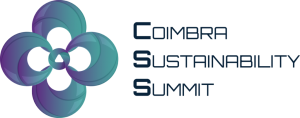Sustainable Growth at the Interception of Technology and Innovation Ecosystems
2nd edition – May 2021 | Coimbra, Portugal
(More information coming soon. Stay tuned!)
The Coimbra Sustainability Conference 2021 will demonstrate that Green Deal and Digital Transformation are two sides of the same coin.
The conference will focus on 4 pillars:
- Public Policy and regulation in the European Digital Market
- Education and training
- Involvement of SMEs in the innovation process
- Adoption of innovative technologies by SMEs
Public Policy and regulation: in the European Digital Market, the focus of this pillar is to identify and propose concrete actions in areas where European Regulation is missing and preventing general adoption of emerging technologies such as blockchain.
Education and training: will address the gap of skilled workers in information technology including measures to balance the gender bias. The gap ranges from students to C Level where the awareness of the tools available can be significantly improved.
Involvement of SMEs in the innovation process: traditional SMEs are yet to discover and value the importance of innovation as a means to add value to their products and services. This pillar will be lead by clusters and try to identify new opportunities to engage with traditional SMEs in innovation processes
Adoption of innovative technologies by SMEs: will focus on how the results of funded projects can be maximized by fostering the adoption of the tools developed by SMEs.
Recap the 1st edition | 18-29 May 2020
What was the scope of the event?
As Agents of Innovation we need to do our part in addressing the societal challenges the planet faces and at least try to address some of the 17 Sustainable Development Goals defined by the United Nations in 2015. Our vision was to debate how new technology interceptions can support decent work and economic growth by creating new partnerships to achieve those goals. We choose to address Health, Agri-food, Manufacturing and Sustainable Cities.
The CSS was financed by the DIATOMIC project ‘ Digital Innovation Hubs boosting European Microelectronics Industry. DIATOMIC aims to establish a sustainable ecosystem to facilitate AME/SSI-based innovation in the Health, Agrifood and Manufacturing sectors, all of which are under-digitized and of prime importance for society and the economy. SMEs and mid-caps from all sectors — the appropriate innovation actors to conceptualise novel digital products, processes and business models — face several challenges. They have limited knowledge of what smart electronics and smart systems can do.
The Cycle explored growth opportunities at the intersection of four areas of digitalization that are considered fundamental for growth: Artificial Intelligence, Blockchain, Internet of Things and Cybersecurity, trying to demonstrate how combining elements of these technologies can
tackle the needs of the four application domains.
Who were the participants of the CSS?
During the two weeks of the Summit, keynote speakers and pitching sessions participants addressed how the sustainable development goals are driving public policy, which are the key challenges in the four application domains and how different funding schemes can support innovation, how the interception of different technological areas are being used to foster growth.
The Cycle of Webinars Format
The agenda of the event tried to follow a journey from the strategic view of Sustainable Development Goals (SDGs), the concrete needs that needed to be addressed in the first week, how the key enabling technologies chosen can be used to contribute to addressing the needs and how these developments could be funded in the second week. The goal was to inspire participants in guiding their innovation activities, foster economic growth while contributing to the satisfaction of the SDGs.
Pre-booked brokerage slots were the common matchmaking opportunities for these types of events. The participants applied to have a 2 minutes pitch about their company/product/service, what they are looking for and what they can offer, sharing their contacts to all the audience for getting in touch after the end of the session.
The organization invited a programme committee to ensure overall consistency. Members of this committee were chairs in the sessions. The format for all sessions was very interactive between the speaker, moderator and the audience and was composed by short presentations that included interactive tools to allow feedback from the audience and Q&A followed by a round table between speakers. In order to achieve maximum impact, the session chair, the moderator, the speakers were invited to meet ahead of the event and agree on the narrative to be conveyed. There were five moderators, one for the plenary sessions, and one for each of the thematic sessions for both weeks. This approach ensured a logical flow between sessions.
Check out the M-Sec consortium members’ presentations at the CSS 2020:
Coimbra Sustainability Summit Online Event Agenda
Plenary sessions focused on cross-cutting issues. P1 focused on the importance of the UN SDGs, EU Green Deal and how both will drive public policy. P2 tried to provide a broader perspective on the SDGs by addressing how partnerships and ethical issues must be considered from inception when trying to define new solutions. P3 focused on examples of tech companies that are already using the 4 KETs to deliver value and foster growth and how inverters oversee it. P4 focused on how the new partnerships, eventually developed during the event, can be used to develop new approaches, influence public policy and apply to public funding.
The sectorial sessions of week 1 (H1, A1, M1, S1) focused on identifying challenges in each domain, Health, Agrifood, Manufacturing and Sustainable Cities, which supported the technological solutions discussions of the second week (H2, A2, M2, S2).
Participant’s benefit:
-
Free registration and opportunity for diverse talks and sessions
-
Opportunity to participate in sessions with great speakers about the SDGs and how technology can boost solution
-
Find out new funding opportunities
-
Meet peers in matchmaking sessions and make new partnerships
-
Unique chance to pitch to investors
![]() This project has received funding from the European Union’s Horizon 2020 research and innovation programme under grant agreement No. 824509.
This project has received funding from the European Union’s Horizon 2020 research and innovation programme under grant agreement No. 824509.


